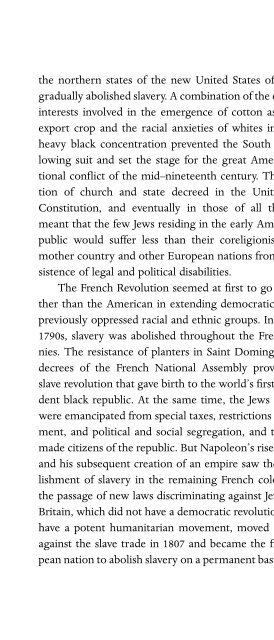Racism - A Short History - George M Fredrickson.pdf - WNLibrary
Racism - A Short History - George M Fredrickson.pdf - WNLibrary
Racism - A Short History - George M Fredrickson.pdf - WNLibrary
You also want an ePaper? Increase the reach of your titles
YUMPU automatically turns print PDFs into web optimized ePapers that Google loves.
EPILOGUE <strong>Racism</strong> in the Twenty-First Century<br />
siveness; any one of them can provoke disdain, discrimination,<br />
or violence on the part of another group that does<br />
not share the trait or traits that have come to define ethnic<br />
Otherness. It is justifiable, as I once did in an essay, to describe<br />
the essence of racism as ethnicity made hierarchical,<br />
or, in other words, making difference invidious and disadvantageous<br />
through the application of power. 2 But, as the<br />
preceding chapters of this book suggest, I would now put<br />
more stress than I did then on the presence and articulation<br />
of a belief that the defining traits are innate or unchangeable.<br />
Pigmentation, however, is not the only supposedly<br />
indelible mark of difference upon which racism can be<br />
based, as the history of antisemitism clearly demonstrates.<br />
In September 2001 the United Nations sponsored a<br />
World Conference on <strong>Racism</strong>, Racial Discrimination, Xenophobia,<br />
and Related Intolerance in Durban, South Africa.<br />
This multiple terminology suggests that doubt may have<br />
existed as to whether the use of the term “racism” by itself<br />
was sufficient to denote all the hostilities and oppressions<br />
that concerned the conferees. In the introduction to this<br />
book I made distinctions between racism and xenophobia<br />
and between racial and religious intolerance. Xenophobia<br />
(literally the fear of strangers) is an ancient and virtually<br />
universal phenomenon, while racism, I have argued, is a<br />
historical construction with a traceable career covering the<br />
period between the fourteenth century and the twentyfirst.<br />
Religious bigotry is directed at what people believe<br />
and not at what they are. Unlike “racial” characteristics,<br />
religious convictions are usually considered changeable by<br />
an act of will. (It is, however, useful to be reminded by<br />
Horowitz that for many groups outside the West, “religion<br />
140
















